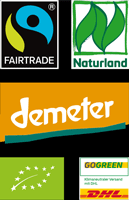Eat. Drink. Help.
Eat. Drink. Help.
Same question every day: What are we going to eat – with a somewhat good conscience? Is meat really a strict no-go? Can my consumption even drive change with regards to CO2 emission, water shortage etc.?
We say: Yes.
Find out how it is done and what you need to consider.
Worry-free eating –
does that even exist anymore?
There was a time when strawberries during winter were a thing. So was meat from Argentina. A real nice tuna steak – indispensable. Well, all of that has changed quite a bit, but according to the Intergovernmental Panel on Climate Change (IPCC) “about 21–37% of total greenhouse gas (GHG) emissions are attributable to the food system”* The exact value depends on what is defined as part of the food system, e.g. the usage of energy during the production and cooking, packaging, transport, waste, etc..
That means: We have quite a leverage to personally achieve improvement. So: Sacrifice, sacrifice, sacrifice? Nope.
The Planetary Health Diet.
Or: The dose makes the poison.
In 2019, the science magazine EAT Lancet published the diet recommendation stated by a group of interdisciplinary experts that is equally healthy for both people and planet. It is called “Planetary Health Diet”**.
The main learning: Half of our diet should consist of fruits & vegetables. And yes, meat is allowed but much less of it. 98g per person per week. Which is not THAT little actually…
Why make this change? According to the Food and Agriculture Organization of the United Nations (FAO), global livestock accounts for 14,5% of all anthropogenic greenhouse gas emissions***. That is the same as the sum of cars, trucks, airplanes, and ships worldwide.
The exception: Game meat. Wild boars, deer, and their friends, who live in the wild and are shot there, are “organic”, cause only low emission, and live in harmony with nature. Obviously, this only applies to local game and only if it is not kept in reserves.
Goodbye roast?
No, surely not.
Game meat from the local hunter could be the solution. So could be fish – if the populations were not overfished. However, the MSC- label **** provides a good orientation.
What about aquacultures or freshwater fish? If fish farming is done right, it can even have positive effects on our climate because the pond’s ecosystems store greenhouse gases.
With poultry it is unfortunately a bit different. With an emission of 4,22kg per kg it comes right after beef and pork regarding climate damage. It makes a difference though, what the poultry is fed with – meaning either with soy (conventional breeding) or for example with local lupins (usually organic breeding).
Which brings us to the next topic: Organic food.
The more organic the better.
Pretty logical: Organic food (no matter if vegetables, meat, or cheese) is always better than conventional food. The strict rules set by Naturland, Bioland, and Demeter support biodiversity, soil and water health. And even better if you buy your groceries at the local farmer’s market. That – and also a membership at the CSA (Community-Supported Agriculture) ***** – supports the farmers and helps them to be more independent from the retail market and its margin-oriented pricing strategy. Which is again another good deed.
Regional. Seasonal.
It cannot be said often enough: Seasonal, local fruit and vegetables are pretty much the best you can buy. Meaning, no strawberries during winter. No tomatoes later than October. No apples from New Zealand. And so on…
That also applies to wine: Local wine is more climate friendly than wine from Europe. And by the way, the cultivation of potatoes is more water conserving than the cultivation of rice.
So, what about coffee? The same rules apply: Organic or Demeter cultivation is a must. Fair Trade as well. Our coffees for example, are cultivated in small, so called, coffee gardens under shade trees. That means: No monocultures, no pesticides, or herbicides. Water is conserved due to lower evaporation. Biodiversity is supported as well as the health of the soil. But one thing is also certain: Coffee does not grow in the USA or Europe and must be shipped – it is a luxury. And should be treated as such. Which we do with the greatest pleasure.
Conclusion: Clearly, it is possible to become “greener” when in come to eating and drinking. It just requires a little bit of effort. It is not about being perfect – no one is. It is about the sum of all the small steps. And that can be quite effective. Let’s go.
*www.ipcc.ch/srccl/
**eatforum.org/lancet-commission/eatinghealthyandsustainable/
***www.fao.org/news/story/en/item/197623/icode/
****www.msc.org/en-us
*****www.localharvest.org/csa/



